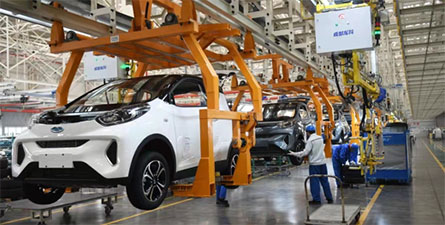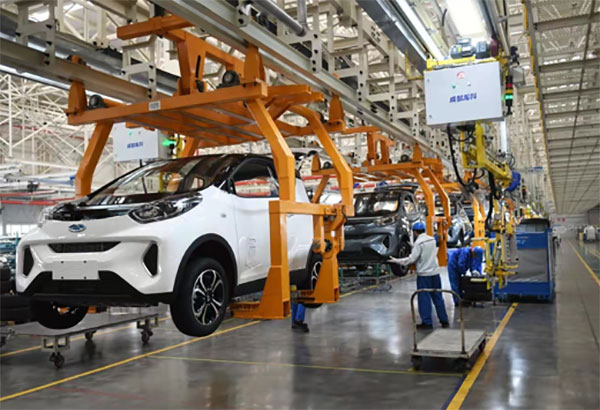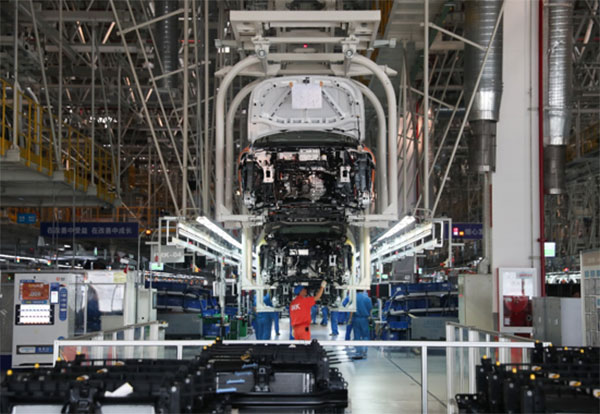News Center

With the continuous development of science and technology and the constant change of market demand, automated production lines have become an important part of modern manufacturing. With the rapid development of artificial intelligence technology, the manufacturing industry to intelligent production is the inevitable transformation and upgrading of China's economy, more and more enterprises began to apply it to non-standard automated production, the integration of information and industrialization, the development of intelligent manufacturing, in order to improve production efficiency, reduce costs, ensure product quality.

Application in the field of new energy vehicles
①Intelligent production management
In the manufacturing of new energy vehicles, the optimization of production management system based on intelligent manufacturing refers to the application of intelligent manufacturing technology to the production and manufacturing of products from the perspective of production management, to achieve the intelligent and information development of production management, and to carry out information control and information integrated management of the product production process. Such as the use of Internet of Things technology, big data technology and other information technology to achieve the safe production of new energy vehicle manufacturing industry, product production and manufacturing process to achieve intelligent monitoring, intelligent equipment production and production data management intelligent.
②Intelligent production line
In the production of new energy vehicles, the most important thing is to ensure the consistency and stability of the product. To achieve this, production lines need to be highly intelligent and automated. Tesla, for example, uses a lot of robots and automation equipment in its production line. Among them, intelligent automation equipment is the core part of the Tesla production line, which can automatically complete the body welding, painting, assembly and other processes in the production process, thereby improving production efficiency and product quality.
In intelligent production lines, the application of artificial intelligence technology is also becoming more and more common. Through artificial intelligence technology, robots on the production line can autonomously complete some simple tasks, such as the identification, handling and assembly of parts. At the same time, equipment such as sensors and cameras in the production line can also collect a large amount of data, which provides support for subsequent data analysis and optimization.
③Intelligent testing equipment
In the manufacturing of new energy vehicles, quality control is very important. If there is a quality problem, it will not only affect the user's experience, but also cause security risks. Therefore, new energy vehicle manufacturers need to install intelligent testing equipment on the production line to ensure the quality and stability of the product. Intelligent inspection equipment can improve inspection efficiency and accuracy through artificial intelligence technology. For example, in the body painting process, the traditional painting quality inspection needs to be carried out manually, which is time-consuming and laborious. Through the intelligent coating detection equipment, the defects and unqualified parts of the coating surface can be automatically identified, and repaired and replaced in time. This can not only improve production efficiency, but also improve product quality and stability.
④Intelligent logistics system
The production process of new energy vehicles requires a lot of logistics support, including the transportation of parts and materials on the production line. In the traditional manufacturing process, these logistics transport often need manual operation, low efficiency and there are certain security risks. The application of intelligent logistics system technology can transform the complex model in the logistics process into a calculable model. After the perfect realization of the whole calculation model, it can optimize the transportation route, transportation mode, storage information management and other services through the algorithm, so as to achieve a significant reduction in logistics costs.
With the continuous development of artificial intelligence technology, more and more enterprises have begun to explore how to apply intelligent technology to logistics systems. For example, the use of artificial intelligence technology to achieve the optimal planning of logistics routes, logistics transportation routes, vehicles, time and other information for intelligent analysis and management, so as to achieve the entire logistics process efficient, fast and safe. In addition, the intelligent logistics system can also carry out logistics transportation through automated equipment such as drones and AGVs, which can avoid the safety risks and efficiency problems caused by manual operation, and improve the efficiency and accuracy of logistics transportation. In the field of new energy vehicle manufacturing, intelligent logistics systems have been widely used, such as Tesla's factory has used a large number of automation equipment to achieve logistics transportation, so as to improve production efficiency and quality.
In short, intelligent logistics system is one of the important application areas of artificial intelligence technology in the field of new energy vehicle manufacturing. With the continuous development of artificial intelligence technology, it is believed that more enterprises will apply intelligent technology to the logistics system in the future, so as to achieve the high efficiency and intelligence of the entire manufacturing process.

Application of artificial intelligence technology in automated production
Artificial intelligence can be applied to non-standard automated production, the specific technology is as follows:
①Machine learning for smart devices: Through the learning and analysis of large amounts of historical data, devices can make intelligent decisions and controls based on real-time situations.
②Deep learning of intelligent devices: Deep learning is an evolution of machine learning, which can process and analyze more complex data and scenarios, and even rapidly integrate and synthesize the analysis results of different different dimensions of data, bringing higher intelligence to non-standard automated production.
③Computer vision of smart devices: Through the use of cameras and sensors and other devices to obtain data, and through artificial intelligence technology to process and analyze, to achieve the understanding and judgment of visual information, so as to be able to more accurately control and operate the device.
④Robotics for smart devices: Robotics can make non-standard automated production work more flexibly and efficiently, improving the production efficiency of equipment and product quality. Adding smart items can make robots more efficient and safer.
⑤Intelligent fault diagnosis: The control unit of the production line will carry out fault diagnosis and troubleshooting according to historical data, improve the efficiency of dealing with problems in the production line, and greatly reduce the possibility of risk, but it needs a lot of data support and information iteration.
The above technologies are not all, with the continuous development and progress of artificial intelligence technology, there will be more technologies applied to non-standard automated production, to achieve more efficient, more intelligent, more accurate production.
Summary and prospect
According to the analysis of the current production and manufacturing process of new energy vehicles, information technology and big data technology have not been fully utilized in the existing production process and working procedure of new energy vehicles to improve the production efficiency and management level of new energy vehicles, and functional modules such as resource planning (QAD system) and production management information system (MES system) should be used. Realize a new mode of production management of new energy vehicles. Under the idea of intelligent manufacturing, the development of the new energy vehicle industry should adhere to the basic principle of customer demand, focusing on the development of new energy vehicle production management methods, production plan control and quality management information, in order to achieve the development goals of intelligent new energy vehicle production and manufacturing.
It is foreseeable that the application of artificial intelligence technology in the field of non-standard automated production will be more and more extensive. With the continuous progress of technology and the continuous reduction of costs, more and more enterprises will apply these technologies to improve their production efficiency and product quality. At the same time, the application of these technologies will also bring more business opportunities and competitive advantages for enterprises. In the field of new energy vehicles, the application of artificial intelligence technology will be more extensive, especially in the key links such as battery assembly, motor production, chassis assembly, which have a crucial impact on product quality and safety, artificial intelligence technology can effectively reduce the impact of human factors on product quality, improve production efficiency and product quality. In short, the application of artificial intelligence technology in non-standard automated production will continue to promote the development and innovation of enterprises. In the future, we can look forward to more intelligent, efficient and safe production lines, as well as more high-quality and high-performance products.
Return to Overview